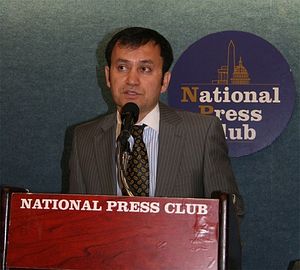Alim Seytoff is president of the Uyghur American Association. He recently spoke with The Diplomat’s Justin McDonnell about the attack in Tiananmen Square in late October, China’s efforts to blame a terrorist movement, and the likely consequences for the Uyghur people.
Beijing has blamed the Tiananmen Square attack on the East Turkestan Islamic Movement (ETIM), entrenched in Central and West Asian regions. How has China responded to the separatist group in the past and what steps are they taking to strengthen national security?
Since 9/11, China called every instance of alleged violence involving Uyghurs the work of ETIM in order to justify its brutal suppression of the Uyghur people’s legitimate demands for human rights, democracy and freedom. Today, we do not believe ETIM exists as an organization. Nobody has any substantive evidence of its existence. Even China never identifies where it is and who its leader is. However, this has not prevented China from invoking the name of ETIM every time something happens involving Uyghurs to justify its crackdown, mute international criticism of its gross human rights violations of the Uyghur people and sow fear among the Han Chinese to win its support for such brutal suppression. Every time China invokes the name of the shadowy ETIM, Chinese security forces target all Uyghurs, not just so-called ETIM members, treating them as terror suspects. China has already done everything possible to strengthen its national security in East Turkestan by turning it into the world’s biggest police state and a concentration camp for the Uyghur people.
Why has the U.S. failed to call this a terrorist act?
I believe the U.S. is closely watching this issue. It has not called it a terrorist attack because Chinese claims cannot be verified by an independent and international organization. Furthermore, there are many holes in Chinese claims. How could a 70-year old woman be a terrorist and ETIM member? Who would bring his wife and aging mother along on a terrorist attack? Therefore, a responsible government like the U.S. will not jump to conclusions and call it a terrorist attack. The U.S. also knows that China will take advantage of any U.S. agreement with Chinese on this issue and aggressively repress the Uyghur people as it has done for the past decade, since the U.S. enlisted ETIM as a terror organization.
China has scolded Western media for suggesting that the attack was linked to a failed ethnic and religious policy. Is Western media guilty of what Foreign Ministry spokesman Hong Lei has called “connivance with terrorists?”
The Chinese position is that anyone or Westerner who doesn’t agree with Chinese government claims on this incident is equal to “connivance with terrorists.” This is not the way a government that has solid evidence to prove the incident is a terrorist attack act behaves; rather it conveys a government that has failed to prove its case before the international community does. Since China has failed to prove it was a genuine terrorist attack, it is no surprise that China attacks Western media for questioning the veracity of its claims.
In China, the government controls all media. In China, all media repeats what Xinhua says on any important issue, such as the Tiananmen car crash. The powerful Chinese propaganda machine can cover up the truth, fabricate a new version and deceive and, to some extent, brainwash the Chinese people. But its propaganda machine cannot deceive and brainwash the international community. Chinese propaganda has its own limits. It can only work in China, not overseas. When China fails to have its suspicious claims accepted as facts by the international community, it attacks the international community instead of presenting substantive evidence of its claim and allowing an independent international investigation.
It has been widely reported that the Uighur community fears a backlash. What kind of backlash would you expect if any does materialize?
Our fear is that China will take advantage of the tragedy in Tiananmen and unleash another round of intensified repression of the entire Uyghur people. There are signs this is happening in East Turkestan. Since October 28, the Chinese security presence was strengthened. Fully armed Chinese security forces have been patrolling Uyghur cities, towns, villages and neighborhoods, ready to kill in any kind of confrontation. Uyghurs live in terror and fear for their lives. Already, more than 50 Uyghurs have been arrested in East Turkestan and more arrests may be coming. Both Chinese senior officials and media are calling for stronger crackdown in East Turkestan. China’s nationalistic Global Times warned that Uyghurs will become the “biggest victims” of this incident in Tiananmen, a veiled threat to the entire Uyghur population.
The government has strengthened urban development in Kashgar but ethnic strife between the Uyghur minority and the Han majority continues. What does Beijing need to do to reduce tensions?
China’s justification for its control of both East Turkestan and Tibet is development. Every time the Chinese government is under attack for its ethnic and religious policies in East Turkestan and Tibet, the Chinese government immediately claims that it has developed both regions and invested in billions of dollars. It has never claimed that it has respected China’s constitution and Regional Ethnic Autonomy Law and allowed both Uyghurs and Tibetans self-rule in their purported autonomies. In fact, all of the development and massive investment are for the transfer and benefit of millions of Han Chinese immigrants into East Turkestan and Tibet. They are never meant for the benefit of the indigenous Uyghur and Tibetan populations.
To reduce tensions, Beijing must respect both China’s constitution and Regional Ethnic Autonomy Law, stop transferring Chinese immigrants into East Turkestan, stop implementing policies of cultural genocide, such as the “bilingual language” policy, job discrimination, attacks on Uyghur identity, religious beliefs and practices, culture, traditions and values, and allow Uyghurs genuine self-rule in the Uyghur Autonomous Region. China must remove its large military and security presence as well as Bingtuan – the semi-military Xinjiang Construction and Production Corp.
































